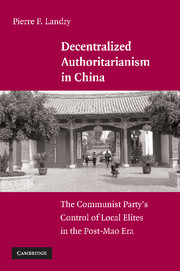 Decentralized Authoritarianism in China
Decentralized Authoritarianism in China Book contents
- Frontmatter
- Contents
- List of Tables
- List of Figures
- Acknowledgments
- List of Abbreviations
- Decentralized Authoritarianism in China
- 1 Authoritarianism and Decentralization
- 2 Organizing Decentralization
- 3 Promoting High-Level Generalists: The Management of Mayors
- 4 Organizational Power: The View from Within
- 5 Explaining Cadre Rank
- 6 The Impact of Village Elections on the Appointment of Party Branch Secretaries
- 7 Conclusion
- References
- Index
3 - Promoting High-Level Generalists: The Management of Mayors
Published online by Cambridge University Press: 22 July 2009
- Frontmatter
- Contents
- List of Tables
- List of Figures
- Acknowledgments
- List of Abbreviations
- Decentralized Authoritarianism in China
- 1 Authoritarianism and Decentralization
- 2 Organizing Decentralization
- 3 Promoting High-Level Generalists: The Management of Mayors
- 4 Organizational Power: The View from Within
- 5 Explaining Cadre Rank
- 6 The Impact of Village Elections on the Appointment of Party Branch Secretaries
- 7 Conclusion
- References
- Index
Summary
During the reform era, the center of gravity of the Chinese political economy tilted decisively toward cities. The unprecedented pace of China's economic transformation favored urban growth, which in turn increased the political relevance of municipalities and the officials who rule them. Cities now control a far greater share of the country's resources than at any point in the history of the People's Republic. In 2000, municipalities accounted for 51.8% of China's GDP, 50.1% of its industrial output, and 76% of the value of services (Jiang and Cui, 2001). This increased economic might was largely purposeful. The center aimed some of its boldest reform initiatives at municipalities, symbolized by the early creation of special economic zones as early as 1979 (Crane, 1990; Kleinberg, 1990). After 1984, economic decentralization was generalized to other areas, but Premier Zhao Ziyang stressed that coastal cities would enjoy economic privileges that would not be extended to the less developed and more rural hinterland (D. Yang, 1990). The leadership's urban bias survived the crisis of 1989: Until 2002, Jiang Zemin and Zhu Rongji — both former mayors and Party secretaries in Shanghai — presided over further reform initiatives that benefited cities (Naughton, 1995; Wang and Hu, 1999).
In parallel with their rapid economic transformation, cities also enjoy greater formal institutional weight.
- Type
- Chapter
- Information
- Decentralized Authoritarianism in ChinaThe Communist Party's Control of Local Elites in the Post-Mao Era, pp. 80 - 115Publisher: Cambridge University PressPrint publication year: 2008
